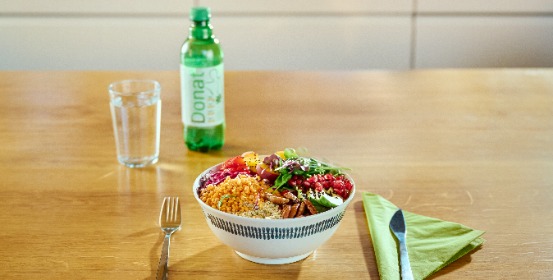Hippocrates, the ancient physician, knew that poor digestion can greatly affect our health when he said: “All disease begins in the gut.” But in modern times, the wisdom of the father of modern medicine is too often forgotten! In the fast pace of modern life, we are not careful about the food we eat, and we are also not consuming enough fluids or getting enough exercise. Why is this causing digestive problems and how can we prevent them?
The role of digestion
Digestion and digestive processes supply the body with the energy and nutrients necessary for its normal functioning. After a meal, it takes six to eight hours for food to pass through the stomach and small intestine, where the absorption of nutrients, the main part of digestion, takes place. The food then enters the large intestine for the last stage of digestion. Finally, waste material and undigested food residue leave the large intestine and are expelled from the body.
Regular and healthy digestion allows our body to take in all the nutrients it needs and to dispose of the waste materials that leave the body in the stool. And most importantly, up to 80% of our immune system is located in our gut, so its health is crucial for the proper functioning of our “defence response”. What this means in practice is that poor digestion makes it more likely that we will get sick.
Poor digestion leads to health problems
Digestive problems such as constipation or bloating affect almost everyone – at least from time to time! According to some data, almost half of us do not have a bowel movement every day. Many people still think they’re just an inconvenience, but frequent digestive problems can take a real toll on our health.
When we feel unwell, chronically tired or moody, we often blame it on stress, fatigue, bad weather… We rarely consider that the cause of our problems may be simpler: poor digestion. This often causes unnecessary retention of harmful substances in the body, thus reducing the effectiveness of the immune system. If we do not have regular bowel movements, we are also troubled by a feeling of fullness that affects our quality of life. But what are the causes?

What slows down digestion?
Most of you already know what follows in the next paragraphs, but there’s no getting around it: the gut is a complex mechanism that’s not suited to today’s way of life. Through food, drink and medicines, we’re introducing many harmful substances into our bodies that are hampering our digestive systems. We often hear that constipation is a disease of modern civilisation, but this is not actually true. Constipation is not a disease of the modern lifestyle, but rather a symptom – like a fever, which is a symptom of the common cold.
There are various causes of constipation or slow digestion, but the most common are:
- excessive consumption of fatty, ready-made foods and sweets;
- an unbalanced diet with insufficient fibre;
- insufficient fluid intake;
- excessive alcohol consumption and/or smoking;
- a lack of exercise and
- taking certain medicines.
Stress also contributes to poor digestion, leading to a vicious cycle: we forget to eat regular meals in the everyday rush, then we become exhausted and reach for sandwiches or ready-made meals instead of cooking. Does this sound all too familiar? Let’s see how a healthy lifestyle can improve digestion.
What helps with poor digestion?
Slow or poor digestion, as well as constipation and bloating, are some of the most common digestive problems – in adults and children alike. It also often affects the elderly and pregnant women.
It is vital to recognise the problem early and address it as soon as possible. Listening to your body and recognising any negative changes is very important.
How can you know if you have poor digestion?
If you’re feeling unwell, have no energy or feel bloated, pay close attention to your bowel movements. Not having a bowel movement for a day is not a cause for concern, as we all have our own rhythm. But if you have bowel movements less than three times a week, you should make some changes.
The following are also common symptoms of digestive problems:
- abdominal pain;
- discomfort when passing stool;
- lumpy, dry, hard stools; and
- a feeling that the bowel has not been sufficiently emptied.
What kinds of constipation are there?
When we are constipated due to an unhealthy lifestyle, we are talking about functional constipation. But it should be noted that poor digestion and constipation can also be linked to various medical conditions. The most common causes are diseases of the digestive tract, endocrine glands, muscles or the nervous system. Allergies or certain medicines can also be a problem. In this case, we are dealing with organic constipation, which cannot be relieved by lifestyle changes, but rather by treating the disease that causes it.
First rule: do not delay when problems arise
Almost everyone is occasionally struck by digestive problems – just think of the heaving festive tables and the consequences of lavish December feasts. But if you’re experiencing more frequent digestive problems, it’s important to take action sooner rather than later. Do you want to first finish an important work project first? Are you thinking of putting off changing your eating habits until after the holidays? We recommend you do the opposite: start as soon as possible, because the timing is never perfect and you can always make incremental adjustments when it comes to adopting healthy habits. For instance, if you start making changes a few weeks before a vacation, it doesn’t mean that you can’t indulge in any “slightly less healthy” treats while you’re away from home.
And if you need support in making healthy choices, we’re only a click away. Donat has made a commitment to helping you on your journey to health and well-being, which is why we’ve developed several Guided Health Programmes. Discover them and join the many others who’ve already decided to make a change for the better.
Healthy digestion is based on a balanced diet
To ease chronic digestive problems, it’s important to get your digestion going again every day. The key to this is a healthy lifestyle, starting with a balanced diet, largely consisting of fruit and vegetables. We should pay particular attention to a sufficient intake of fibre, which is mainly found in plant-based foods. This helps the stool pass through the intestine by increasing its volume and softening it.
Experts distinguish between soluble and insoluble fibres. Soluble fibre can dissolve in water, thus contributing to the viscosity of the intestinal contents in our body. At the same time, it lowers blood sugar or glucose levels. Insoluble fibre (not soluble in water) increases the volume of the stool and speeds up its passage through the digestive tract. This is why it is essential for people with poor digestion. A healthy diet should include a combination of soluble and insoluble fibre, with at least 14 grams of fibre for every 1,000 calories consumed. This translates to around 30 g of fibre per day for most people.
And to help you find sources of fibre, we’ve added a digital cheat sheet to this section. 😉
Best sources of soluble fibre:
- oats,
- peas,
- beans,
- barley,
- apples,
- citrus fruit.
Best sources of insoluble fibre:
- wholemeal flour,
- wheat bran,
- nuts,
- potatoes.
There’s one important warning here: it’s best to gradually increase the amount of fibre in your diet, as any rapid increase can make your symptoms worse.

Make sure you’re well hydrated
Did you know that even mild dehydration can slow you’re your digestion? If you’re not drinking enough, it becomes harder for waste material to pass through the body, as it has to draw the water from the stool. This makes the stool harder and more difficult to pass or excrete from the body. On the other hand, if you’re hydrated the stool is softer and easier to pass.
Experts recommend at least three litres of fluid per day for men and a litre less for women. But don’t follow these figures blindly, as the amount should be adjusted based on the situation. When the weather is hot or you’re more physically active, you also need more fluid.
We also recommend that you avoid sugary drinks when trying to stay hydrated. Water or unsweetened tea are best for your body. If you don’t like plain water, add a few drops of lemon.
Exercise can also help overcome poor digestion
Experts recommend regular exercise, which speeds up bowel movements or peristalsis. Ideally, you should be sweating and panting for at least half an hour a day, but even a short walk can help. The importance of mental health, avoiding stress and getting enough rest are also greatly underestimated, especially in terms of getting enough sleep.
Donat has been proven to speed up digestion
Are you trying to lead a healthy lifestyle, but a healthy digestion is still eluding you? Then we advise you to first try natural laxatives. These include the natural mineral water Donat, which has clinically proven effects on the digestive tract. Due to its exceptionally high sulphate content, Donat helps to draw water from the cells of the intestinal wall, thereby increasing the volume of the stool and easing its passage through the intestines. In addition, magnesium softens the intestinal muscles and further facilitates bowel movements. To learn how to drink Donat to achieve this effect, read this article.
Donat is an excellent complement to a healthy lifestyle, as it can also be used preventively if consumed correctly. It’s a natural osmotic laxative which has no side effects and does not cause dependence.
Frequently asked questions
1. Why is digestion so important for health?
A properly functioning gut ensures the normal absorption of nutrients into the body, and the digestive system is also where most of the immune system cells are located, so its health is key to the resilience of the body as a whole.
2. Why are so many people suffering from digestive problems these days?
The most common causes of bloating, constipation and other digestive problems are modern lifestyles that do not favour our gut. In particular, we burden it with fast foods and fatty foods, insufficient fluid intake, alcohol, cigarettes and sedentary lifestyles.
3. Are we constipated if we don’t have a daily bowel movement?
We all have our own rhythm, so it’s not necessary to pass a stool every day. However, if we only have a bowel movement three times a week or less, this is generally considered to be constipation.
4. How can you ensure a healthy digestive system?
The secret to healthy digestion and thus overall health lies in a balanced, fibre-rich diet, proper hydration, exercise, the right amount of rest and regular physical activity.
5. What can be done if problems with digestion persist despite a healthy lifestyle?
If we don’t notice a change in our digestive routine despite a relatively healthy lifestyle, then it’s important to see a doctor who can also advise us on the use of osmotic laxatives.
Choose chapter:






